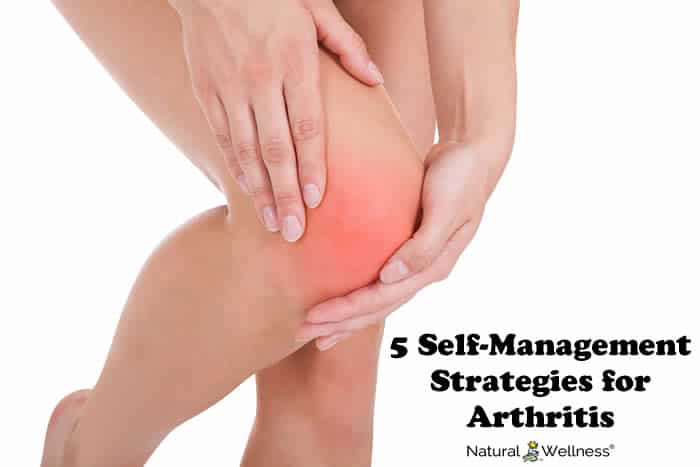5 Great Tips to Help You Self-Manage Symptoms of Arthritis
May is National Arthritis Awareness Month. While there isn’t a cure for arthritis, the goal is to keep pain and inflammation in check in order to continue to ensure joint function. Find out which 5 self-management strategies the CDC recommends to reduce painful symptoms of arthritis and get the relief you need. Plus discover the best supplements and vitamins to consider!

Arthritis is a disease that is affected by millions of people, and unfortunately does not have a cure. People who are affected by this disease oftentimes can no longer carry out their typical daily activities and tasks, with some even deemed disabled. Bringing awareness to arthritis is important so that research and advocacy can be continued.
What Is Arthritis?
A painful disease that affects the joints and connective tissues around the body, arthritis causes a lot of pain, swelling, and limited movement.
There are more than 100 different kinds of arthritis, but the two most common ones are:
- Osteoarthritis
- Rheumatoid arthritis
Osteoarthritis affects joints, especially weight-bearing such as the knee, hip, and spine. Cartilage at the ends of bone act as padding, which is destroyed by osteoarthritis. Without that padding, a narrow joint space is created and can cause bone overgrowth, bone spurs, and reduced function. Osteoarthritis is typically found in most people as they age, but young individuals can be affected by it due to an injury or overuse (1).
Rheumatoid arthritis is a disease that causes inflammation of the joint linings. This inflammation can also affect organs such as the heart or lungs.
Signs and Symptoms
Symptoms of arthritis can vary, but most of the common ones include (1):
- Pain in 1 or more joints that is ongoing, or occurs often
- Warmth or redness in 1 or more joints
- Swelling in 1 or more joints
- Stiffness in 1 or more joints
- Complications moving 1 or more joints as normal
These symptoms could indicate other health conditions, so it’s best to follow up with your doctor for an official diagnosis.
Certain tests can be done to verify whether or not you’re affected by arthritis. Some of them include:
- RF (rheumatoid factor) and CCP (cyclic citrullinated peptide) antibody tests (2) – measures the amount of RF in your blood, which is a protein produced by the immune system. RF attacks healthy joints, glands, or other normal cells by mistake.
- Sedimentation rate – finds inflammation
- X-rays or other imaging tests – can verify if a joint is damaged
Self-Care to Manage Arthritis Symptoms
Since there is not a cure for arthritis, the goal is to keep pain and inflammation at a minimum to continue to ensure joint function.
The Center for Disease Control and Prevention (CDC) recommends 5 self-management strategies to reduce symptoms of arthritis and get relief (3):
1. Learn new self-management skills

When it comes to creating new self-management skills, the CDC recommends joining an education workshop. These workshops can help to better manage arthritis so you’re not only managing pain and improving your mood, but you’ll also be able to better communicate with your health care provider regarding your care.
2. Be active
Staying as physically active as possible is an effective way to relieving pain associated with arthritis. The Physical Activity Guidelines for Americans recommends that adults incorporate moderately intense activity into their routine for 150 minutes per week. Doing so can not only manage your arthritis symptoms, but it also reduces your risk of developing other chronic diseases.
3. Talk to your doctor
Keep regular appointments and follow the recommended treatment plans. Your doctor is there to help minimize symptoms and prevent the arthritis from getting worse. Keep them updated on any additional joint pain or other symptoms that may arise.
4. Manage your weight
Additional weight creates stress on joints, especially on weight-bearing joints such as your knees and hips. Even a decrease in 10 to 12 pounds can improve pain and function for people with arthritis.
5. Protect your joints

Avoid creating any further injury to your joints, which can make arthritis worse or even cause it. Activities that are lower impact and therefore easier on the joints include biking, swimming, and walking. You can also be more cautious by wearing protective equipment and avoiding repetitive movements when working or playing sports.
The Best Supplements & Vitamins to Consider
Prescription medications can sometimes be costly, not to mention the side effects that may come along with them. The Arthritis Foundation (4) compiled a list of several nutrition supplements that have been studied and show promise in relieving the painful arthritis symptoms.
The supplements include:
- Glucosamine and chondroitin – These supplements are components of cartilage, and are the most commonly used supplements for arthritis. A study done in 2016 found that the combination of these two compounds was just as effective as the NSAID celecoxib at reducing stiffness, pain, and swelling in knee osteoarthritis. Natural Wellness’s Joint Support is a natural joint supplement that combines glucosamine, chondroitin, MSM, turmeric and more to support joint function and mobility.
- Fish oil – Polyunsaturated omega-3 fatty acids found in these supplements are beneficial in reducing inflammation. A 2017 study found that taking an omega-3 supplement reduce joint pain, stiffness, and swelling in rheumatoid arthritis. Natural Wellness’s Super Omega-3 Fish Oil is harvested from the best fish sources – sardine and anchovy – and the fish oil contains 1000 mgs of active omega-3 fatty acids EPA and DHA.
- S-adenosyl-methionine (SAM-e) – This is a natural compound that is found in our body and is anti-inflammatory, cartilage-protecting, and pain-relieving. Some studies have shown that it is even as good a pain reliever as NSAIDs, such as ibuprofen.
- Curcumin – The compound that is found in the spice turmeric, curcumin can be a powerful anti-inflammatory agent. It is also believed to relieve rheumatoid arthritis swelling and tenderness. One study found that taking 1500 mg per day dose of curcumin extract was just as effective as a 1200 mg daily dose of ibuprofen.
- When it comes to vitamins, both vitamin D and K are important for bone strength. Vitamin K is also involved with cartilage structure. Since these are both fat-soluble vitamins and could be harmful if over consumed, it’s important to check with your doctor before taking them to discuss safe amounts.
The Importance of Physical Activity
Physical activity should be emphasized and promoted as a beneficial strategy to relieving arthritis symptoms. This doesn’t mean you need to overdo it; even a lap around the pool or walk around the block can be beneficial.
Mayo Clinic (5) states that exercise can:
- Strengthen the muscles around your joints
- Help maintain bone strength
- Give you more energy
- Make it easier for you to sleep
- Help control your weight
- Enhance quality of life
- Improve your balance
They also recommend discussing with your doctor or physical therapist to find an exercise that would work best for you.
A few common exercises that work best for individuals dealing with arthritis include:
- Range-of-motion exercises (raising arms over your head, rolling shoulders forward and back)
- Strengthening exercises (weight training)
- Aerobic exercise (elliptical, walking, biking, swimming)
One study published in Joint Bone Spine (6) wanted to review the effects physical activity has on patients with rheumatoid arthritis. It was found that physical activity slowed the atherosclerotic process and had a favorable effect on bone by increasing the bone mineral density.
It was also shown to increase self-esteem, alleviate depression, improve sleep quality, and decrease pain perception.
Conclusion
While arthritis may not be curable, it is manageable. Hopefully the tips above can help relieve your pain and make some of your daily activities much more comfortable.








